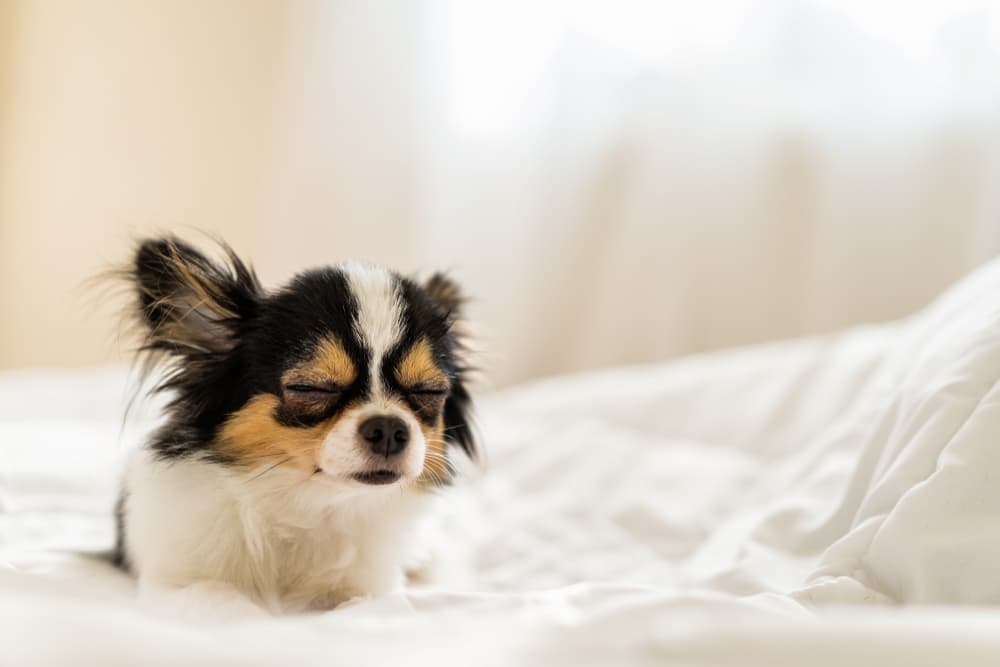It’s a reality of life: Canine sleep quite a bit. And whether or not you’ve obtained a pet that topples over after playtime or an excellent ol’ boy who snoozes the day away, you’ve seemingly spent loads of time fawning over the adorableness that may be a sleeping canine.
But when your canine sleeps all day lengthy, you would possibly begin to marvel, Why do canines sleep a lot? And the way a lot sleep do canines really want?
Learn on to be taught all the things you’ll want to learn about why canines sleep a lot and when you must fear about your significantly drowsy canine, with professional perception from veterinarians.
Understanding Canine Sleep Patterns
Whilst you seemingly take far fewer naps than your canine, the sample of a canine’s sleep cycle is definitely similar to ours, says Dr. Jerry Klein, chief veterinary officer of the American Kennel Membership (AKC). Like us, canines get the vast majority of their deep, restorative sleep from 9:00 p.m. to six:00 a.m. In a full sleep cycle, our our bodies and minds downshift from wakefulness to drowsiness, mild sleep (or non-REM sleep), adopted by a ultimate section referred to as REM sleep (or speedy eye motion sleep), the deep sleep throughout which our eyelids flicker and we dream (1).
The primary distinction between our sleeping habits and our canine’s sleeping habits is fairly noticeable: Canine are likely to sleep briefly bursts all through the day whereas our common sleep cycle clocks in at about seven to 9 hours at night time with a gradual roll into REM sleep.
However analysis exhibits that canines can flick out and in of deep sleep inside simply 20 minutes. Your pup can also be extra more likely to abruptly get up after a interval of deep sleep when you’re nonetheless fumbling round in that blurry, confused state referred to as “sleep inertia.” Scientists hypothesize this will occur as a result of your pup’s ancestors had been extremely alert to their environment and sometimes wanted to get up shortly (2).
Should you’ve ever watched your canine sleeping and puzzled if they really dream, the cuteness is actual: These flickering eyelids and twitchy legs are a sign that your canine is deep in REM sleep, and research present their mind waves look identical to ours after we’re dreaming (3).
How Many Hours a Day Do Canine Sleep?
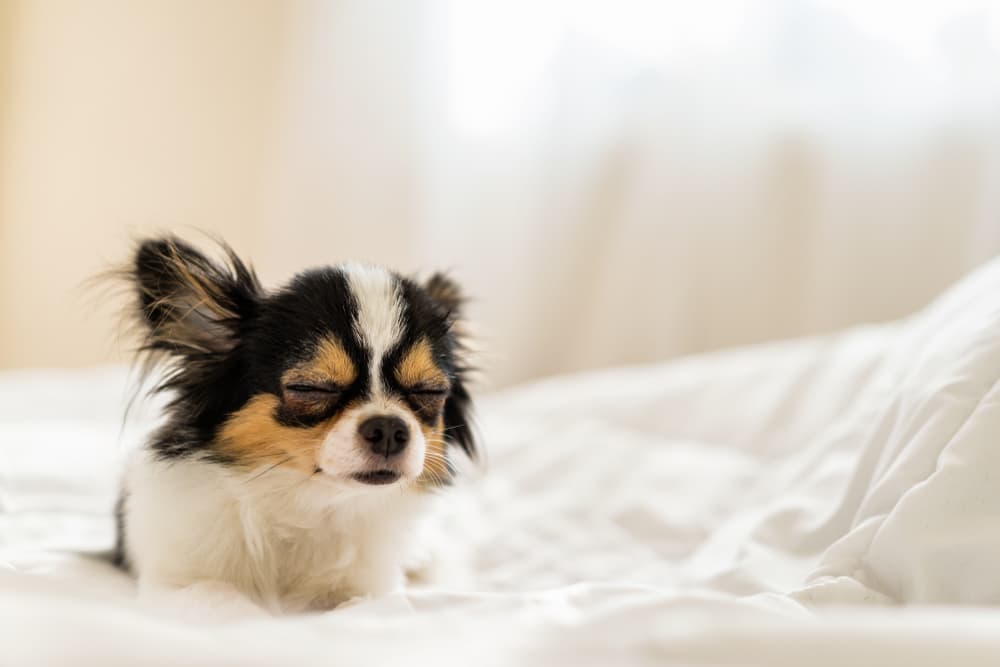
The common, wholesome canine spends about half of their day (8 to 14 hours) sleeping, one other 20 p.c of their day awake-but-lounging, and about 30 p.c of their day lively (4)(5).
Nonetheless, simply how a lot sleep your canine wants can range based mostly on their age, dimension, and breed, says Dr. Rachel Barrack, a veterinarian and proprietor of Animal Acupuncture based mostly in New York Metropolis.
For example, in case your aged canine is slowing down, you’ve seemingly puzzled, Why do outdated canines sleep a lot? Older canines are drained out quicker from day-to-day residing merely as a result of pure growing older course of.
Whereas the specifics have but to be studied, large-breed canines can also sleep extra in comparison with smaller-breed canines and working-breed canines, which are typically extra alert and energetic, says Barrack.
How A lot Do Puppies Sleep?
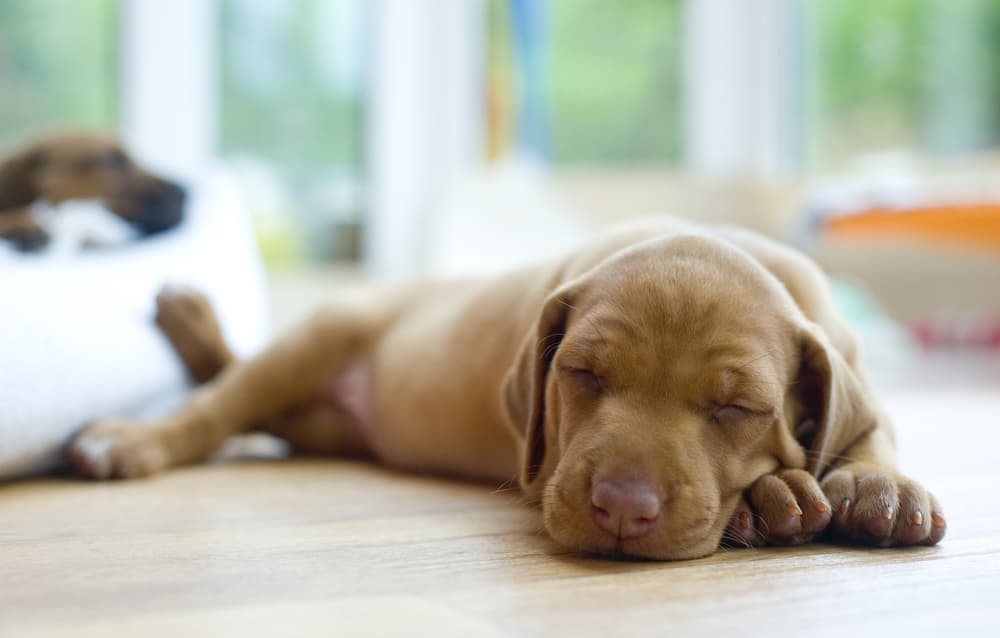
Whereas very younger puppies spend a lot of their waking hours studying and exploring, like infants and kids they tucker out quick and wish about 18 to twenty hours of sleep a day, says Klein.
Very like our little ones, puppies sleep quite a bit as a result of they’re bodily and mentally rising at such a speedy tempo, explains Dr. Kristi Flynn, an assistant professor within the division of veterinary scientific companies on the College of Minnesota in St. Paul, Minnesota.
Tempted to carry your pet to a strict “sleep schedule” within the hopes that they received’t have an accident at night time? It’s regular for younger puppies to want to exit at odd hours till they’re older and capable of bodily maintain their bladder for longer, says Klein. As such, it’s high quality to ascertain a morning and night routine along with your canine to work on home coaching, however don’t maintain it towards them if they’ll’t fairly follow it, as they’re nonetheless growing.
Why Do Canine Sleep So A lot?
Since little analysis has been completed on the science of canine sleep, we don’t know precisely why canines sleep a lot (6). Whereas their canine relations like arctic foxes and grey wolves are most lively at night time, it could be that home canines sleep at night time (in addition to on and off throughout the day) as an adaptation to life with their human companions, per a 2020 evaluation in Present Opinion in Behavioral Sciences.
In any other case, canines sleep a lot for a similar causes we do: They’re getting the restorative relaxation their our bodies and minds must perform optimally, processing and storing away recollections, and studying spectacular new phrases and tips like “sit” and “lie down.”
Is My Canine Sleeping Due to Boredom?
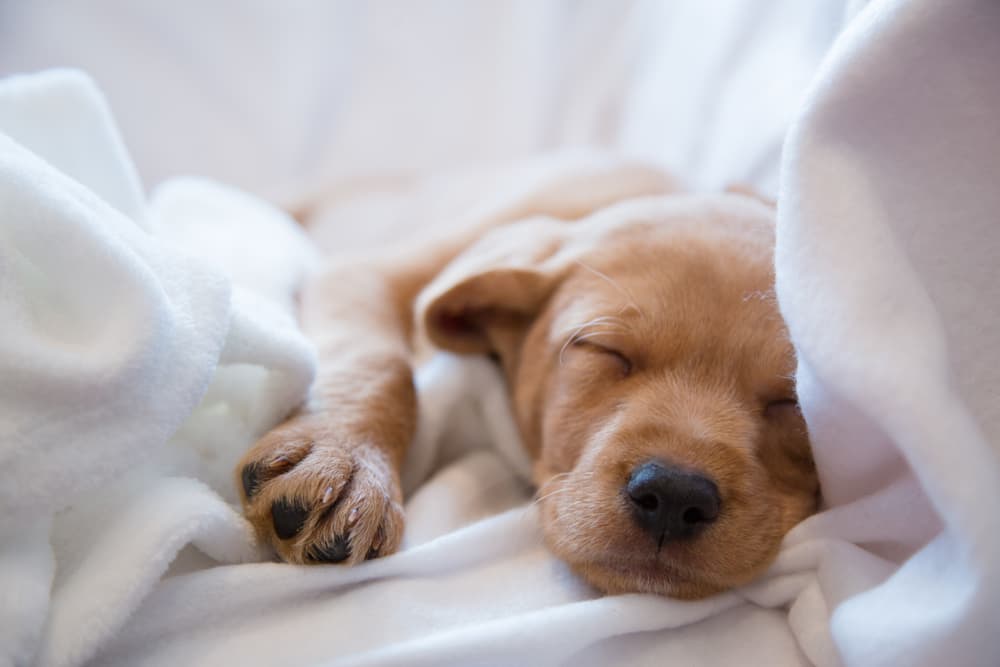
All canines naturally want a lot of sleep, however environmental elements like how a lot time your pup spends exercising or, conversely, time disadvantaged of playtime with pet mother and father and associates, may cause a shift in canine sleeping habits (7).
For instance, one research revealed within the Journal of Veterinary Habits discovered that canines stored in a barren analysis facility slept about 20 p.c extra usually than canines who had been supplied with environmental enrichment in a contemporary facility.
In case your canine has a clear invoice of well being however has taken to all-day snooze fests, weaving extra train and social interplay into their day with noon walks, toys, and doggy daycare can assist you guarantee they aren’t sleeping out of sheer boredom (8).
Irregular Canine Sleep Habits
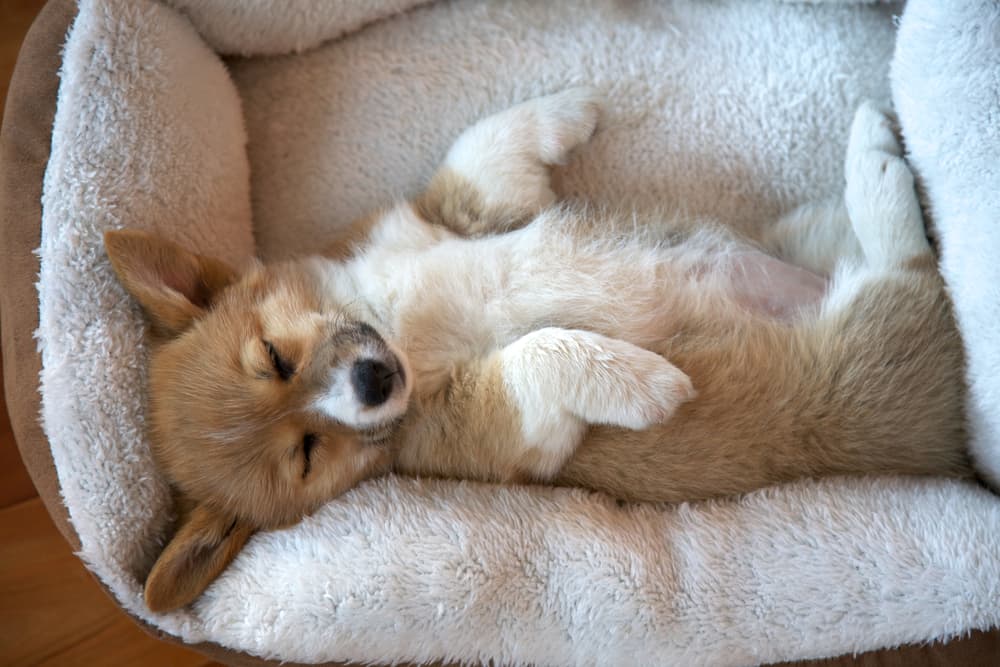
Should you’ve dominated out boredom as an element however you’re nonetheless involved your canine could also be sleeping greater than he usually does, it could be time for a veterinary go to. A change in sleep habits may point out a deeper well being problem.
Right here, a number of irregular and probably worrisome sleep habits to look out for:
Your canine sleeps all day. An additional-drowsy canine could also be affected by melancholy, diabetes, an out-of-whack thyroid, or listening to loss.
His sleep schedule is off. Is your aged canine wandering round at night time rapidly, having accidents, and out of kinds? A change in an older canine’s sleeping patterns might be an indication of canine cognitive dysfunction (CCD), which causes habits adjustments just like “sundowning” on account of dementia in folks, says. Flynn.
Your canine has hassle respiratory or snores in his sleep. Sleep-disordered respiratory may cause loud loud night breathing and daytime drowsiness, particularly in short-nosed and toy canine breeds akin to English bulldogs, Boston terriers, Pekinese, and pugs, says Barrack.
He all of a sudden passes out in the course of the day. In case your pet falls asleep mid-play or mealtime, he could have canine narcolepsy, a uncommon neurological dysfunction that may be inherited by breeds akin to Doberman pinschers and Labrador retrievers. Signs usually first seem in younger pups (9).
He actually chases rabbits in his sleep. In case your canine begins twitching in his sleep after which pops up and begins working, barking, or attacking, he could have REM Sleep Habits Dysfunction, a sleep problem that may trigger excessive or violent bodily exercise throughout sleep (10).
Right here’s when to fret: “Any noticeable change in a canine’s routine or habits, whether or not it’s a change in thirst, urination, urge for food, habits, or sleep, warrants a dialogue along with your veterinarian to rule out any underlying medical trigger,” says Klein.
Keep in mind: You understand your canine higher than anybody else, and for those who suspect one thing’s incorrect together with his sleep well being, consultants agree—the earlier you may get your pup checked out, the higher. In any other case? Let sleeping canines lie.
,
,

